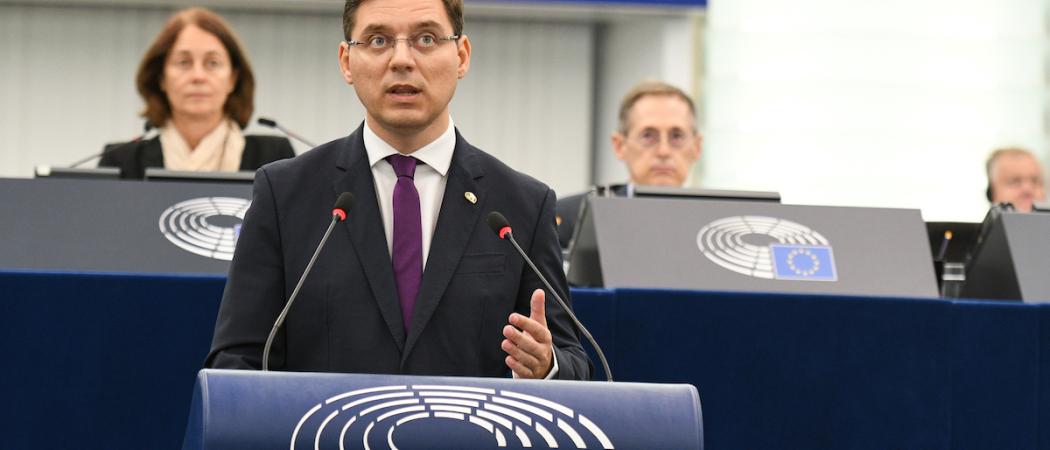Proposed €400M cut to Horizon Europe would undermine competitiveness, MEPs argue. Member states maintain a ‘prudent’ position

Victor Negrescu MEP. Photo: European Parliament
The European Parliament is opposing proposed cuts to the 2025 EU budget, which includes slashing €400 million from Horizon Europe.
The proposal for next year’s EU budget “cannot be accepted,” said Victor Negrescu, rapporteur for the 2025 budget, during a debate in Strasbourg last month.
In September, national governments agreed on a “prudent” budget, which would see €8.17 billion of cuts overall. In addition to the €400 million knocked off Horizon Europe, the Erasmus+ student exchange programme would be cut by €295 million.
Parliament is determined to “restore the numbers and ask for increases” for research and innovation. “We strongly believe these investments are crucial for the competitiveness of the EU,” Negrescu told Science|Business.
National governments don’t see it that way. Hungarian Minister Péter Banai, who is responsible for the budget negotiations, pointed to a risk of stagnation in the EU economy and increasing debt financing costs, in addition to the war in Ukraine, to justify the cuts. “Member states are now working on serious consolidation of their own national budgets,” Banai told MEPs.
Mattias Björnmalm, secretary general of CESAER, an international association of universities, said the proposed cuts are “unacceptable, incomprehensible and highly counterproductive”.
Administrative obstacles
Negotiations over next year’s budget continue while the new Parliament and Commission settle in, and just after Mario Draghi, former Italian prime minister, called on the EU to reinforce innovation in order to boost competitiveness.
Draghi said the EU research and innovation budget should double to €200 billion in the 2028-2034 cycle, to catch up with the US and China. But he also pointed to administrative obstacles in accessing Horizon Europe funding, saying. “We need to increase the intensity of financing.”
In April, Enrico Letta, another former Italian prime minister, rated research and innovation as a high priority in his report on the single market. The Commission has also identified low investment in research as one of the key reasons for the EU’s near economic stagnation in its European Semester report.
Johannes Hahn, current commissioner for budget, told MEPs that cuts to Horizon Europe and other programmes, “are at odds with the shared objective to reinforce the union's competitiveness and EU security”.
However, the Commission’s proposal for 2025 is also lower than the amount agreed for 2024, with about €200 million less for Horizon Europe.
For Negrescu, it is clear that national governments “perceive these programmes as being unnecessary costs, with no return on investment” while “the European Commission seems too weak in defending the interests of the EU citizens.”
Cuts to Horizon Europe and Erasmus+ would “severely limit” European universities’ contribution to breakthrough developments, Björnmalm said. He also warned of a potential brain drain of top researchers from the EU.
Fair, green and digital
MEPs are aligned in supporting a substantial 2025 budget for Horizon Europe as they aim to prioritise programmes for health, education, agriculture, and a “fair, green and digital” transition.
“With strong arguments and a unified European Parliament position we will hopefully manage to save some of those crucial funds for flagship EU programmes and many others,” Negrescu said.
Parliament will vote on its own 2025 budget this month. Negotiations with national governments and the Commission are open until November 18, the legal deadline for reaching an agreement.
Meanwhile, MEPs are also getting ready to negotiate the next multiannual financial framework (MFF), which is due to start in 2028. Earlier this week, the Parliament appointed Siegfried Mureşan (EPP) and Carla Tavares (S&D) as new rapporteurs for the long-term EU budget. They will prepare Parliament's position on the MFF, including allocations for EU research programmes, ahead of a Commission proposal expected to be published by June 2025.





 A unique international forum for public research organisations and companies to connect their external engagement with strategic interests around their R&D system.
A unique international forum for public research organisations and companies to connect their external engagement with strategic interests around their R&D system.